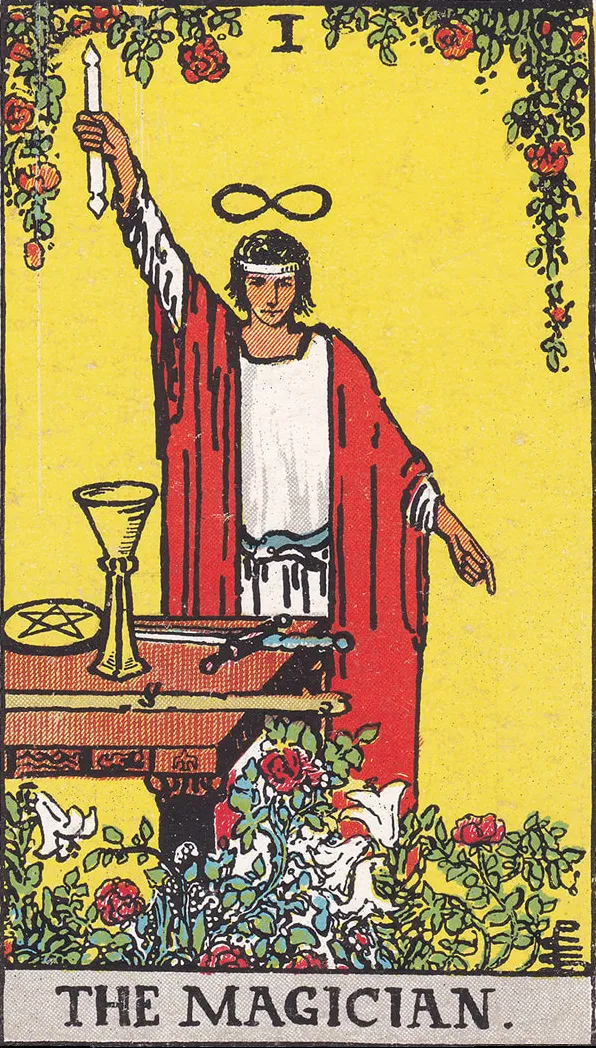Accessible, Understandable Answers in a Broad Domain of Interest (rwblog S6E20)
Hello frens! I hope you are doing well during these rainy San Francisco days, or whatever the weather is like where you are.

The Magician from the Rider-Waite-Smith tarot deck. On a related note, I highly highly recommend the episode “Queen of Tarot” from Imaginary Worlds, which explores Pamela Colman-Smith’s (wild) life as an artist.
Folk Mental Models
So one thing I’ve been thinking about lately is astrology and tarot. (Actually, I think about them somewhat frequently, but I’ve been thinking about them more due to the presence of tarot cards in Balatro; see below.) Both are examples of what I’ll call folk mental models — systems of thinking that provide accessible, understandable answers in a broad domain of interest (e.g. human psychology), but are:
- Shared between individuals; a fully-private framework doesn’t count
- Not fully formalized or institutionalized1 and thus varying from person to person
- Widely popular but not fully mainstream
- Accepted on the basis of faith, intuition, or anecdote rather than rigorous empirical evidence; or, not even recognized as a system of thought at all!
What are other examples? The pop-psychology understanding of MBTI personality types, especially the archetypes described on sites like 16 Personalities, are the first example many San Franciscans would likely think of2. Love languages probably count, too — they’re widely referenced in the social circles I run in, even though they were basically just made up and in fact somewhat incoherent when analyzed philosophically..
But folk mental models are more common than usually recognized! For instance, take health foods. Many Westerners today have an intuitive sense of which foods are and aren’t “healthy”. Salads are good, potato chips are bad. Are these judgements actually true in a strictly empirical sense? Eeeeehhhhh feels like the jury is out on that one3 — some would argue we should all eat nothing but raw potatoes, salt, and olive oil — but that doesn’t stop folks from using their sense of “healthiness” to guide their actions. Perhaps there are other folk mental models guiding our actions that we don’t think about?
Folk mental models can sometimes move into the mainstream and become institutionalized. For instance, I suspect Traditional Chinese Medicine (TCM) started as a vague, culturally-informed folk mental model about health and wellness before being written down and institutionalized as a coherent medical practice harmonized with large-scale cultural beliefs like qi. Indeed, “science” as a discipline is arguably a folk mental model gone formal — but maybe I’ll think about that another time.
Also, may I recommend my doc on my own thinking patterns 😉
In Other News
- I wrote a web extension! It’s called Sneak and it lets you open links in your browser from the command line, taking inspiration from the Sneak plugin for vim. It’s live now on the Apple App Store and (hopefully) soon on the Chrome Web Store4. Writing it was easy-peasy thanks to the wxt framework; highly recommended if you want to write a web standards™️ web extension using nice tools like TypeScript and Vite.
- I wrote an article about rewriting my resume in Typst, a new-ish competitor to LaTeX with wild syntax.
- Are you playing Balatro? You should be playing Balatro; it single-handedly brought me out of gaming retirement.5 For the gamers in the audience: it’s a poker deckbuilding roguelite. For the non-gamers: it’s a super-simple, super-addictive game where you score points by playing illegal poker hands, and you get to upgrade your deck of playing cards in between rounds. It’s only $15 with no extra subscription or microtransactions necessary. Highly highly recommended.
-
There’s no widely-accepted Institute of Cartomancy, for instance, though Biddy comes close. ↩
-
Though personally I agree with Dynomight that MBTI is basically just the Big Five from academic personality psychology. ↩
-
Although see The Hungry Brain for my favorite pop-science take on nutrition. ↩
-
It got held up because my cute sneaker shoe icon was “misleading” 😒 ↩
-
Well, that and reading Tomorrow, and Tomorrow, and Tomorrow last year. ↩